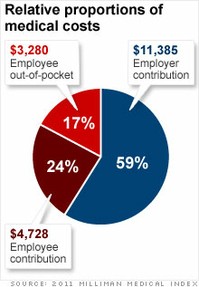 Just as with any good or service, health insurance has its value; therefore it has a cost, and in the current way we fund healthcare in America - We(the people) pay those costs.
Just as with any good or service, health insurance has its value; therefore it has a cost, and in the current way we fund healthcare in America - We(the people) pay those costs.
Whether it be in conjunction with our employers, or through taxation by our government or some "fortunate/ not-so fortunate" who have and pay individually. They pay a cost - in the form of premiums - to have coverage in the event they need special care (emergency) or consultation and preventative care (maintenance). Depending on the circumstance, the cost of which can range from little or below 100$(USD) to way above 10,000$(USD), solely based on the needs of the patient.
This model works generally as long as people, considering the long term costs, maintain and monitor their health status - thus keeping the overall costs to the insurer down. He is after all trying to make a profit while aiding you in getting care... and therein lies the value, I might add mutually agreed by all parties.
However a problem arises, and in the here and now the problem has arisen - that costs and value are so closely aligned that there is less profit to the insurer because of more costs he has to pay. Although, to the family of insured, the costs would seem the same (percentage wise) - the company providing the insurance which hoped to maintain a profit of (x) an unknown, now has to be willing to accept something different or begin to cut their costs; and this is how the trouble began.
Americans and employees - paid their premiums... as costs rose they pay their copay paid their deductible, and still costs rise. So now they ask - where's the benefit?
As premiums rise - co-pays rise - deductibles are raised, but coverage remains the same or in some cases lessened or is capped. Where is the value in that? Where is the value in maintaining basic health which has become barely affordable... when in the end the "excess" costs are passed to the individual anyway. Leaving them in some cases unable to even meet the standard costs of living.
This, in a country which prides itself on being number one. (For the People, By the People)
The people bear the costs - even if they can't afford the benefit, even if kills them worrying about how to pay.
But that's only one hand of the costs...






 Just as with any good or service, health insurance has its value; therefore it has a cost, and in the current way we fund healthcare in America - We(the people) pay those costs.
Just as with any good or service, health insurance has its value; therefore it has a cost, and in the current way we fund healthcare in America - We(the people) pay those costs.






 Given where we've been so far, with medicare now entrenched as part of the social contract of America its time to ask is there more?
Given where we've been so far, with medicare now entrenched as part of the social contract of America its time to ask is there more?




 Developing Patience:on 03/16/2013
Developing Patience:on 03/16/2013
 In Dependent State (The Growing Cycle of Dependency)on 03/04/2013
In Dependent State (The Growing Cycle of Dependency)on 03/04/2013
 Where Is God?on 04/04/2012
Where Is God?on 04/04/2012
 Sunny Morning Treatson 04/11/2012
Sunny Morning Treatson 04/11/2012



Comments
the thing is no one may ever get it completely right, but there has to some progress toward attempting to ensure the society as a whole is better for being a society.
I think we should look at health as investment. All developed countries have some sort of public care health system but it seems none is working perfectly. In the end of the day we are all responsible for ourselves.